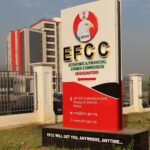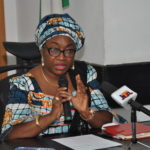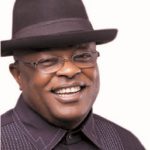Three years of Buharinomics…
KEN UGBECHIE

Three years ago, the cock crew to herald a change of government in Nigeria. It was the first time that an incumbent political party was defeated in a national election. Though the election of that year 2015 had too many flaws as did other elections in the past, Nigerians simply ignored the gross electoral malpractices and gladly accepted the result. And they should because the outcome reflected the sweeping frenzy across the nation.
The incumbent PDP was faltering after it hit a notch of successes in the economy, achieved socio-political stability and improved the nation’s international rating. But the same PDP lost its soul when it went into a bazaar of looting. It lost its soul when it made light the grave matter of insecurity symbolized by the annexation of parts of Nigeria by the Boko Haram insurgents. Power supply also dipped after the Goodluck Jonathan at a time achieved a near-state of regular power supply, a period that rendered my ever reliable generator idle.
Such were the poor indicators that de-marketed the PDP government and it was no surprise that Nigerians welcomed the Muhammadu Buhari government with great enthusiasm and expectation. The APC government of Buhari made matters worse by promising so much without a rational and strategic formula on how to fix the nation. In an essay published before the 2015 election, I did warn that truly Nigeria needed a change, but that Buhari was not that change.
Just an excerpt from that article published in Thisday newspaper and Political Economist magazine shortly before the 2015 election: “No doubt, Nigeria needs a change, a breath of fresh air. But the stark truth is that Buhari is not that change. He is nowhere near. He cannot as a leader birth a better nation. All through his military career including as Head of State and even now as a democrat (let’s assume he is one), he is yet to come to terms with the nuances of cognitive leadership, the type needed in the 21st century to transform any community.”
Today, by hindsight, there is precision and poignant accuracy in my prediction. Buhari was not the change Nigeria needed in 2015. The APC could have fielded a younger, better cognitively and intellectually endowed candidate who understood global economics, who is versed in the concept of ‘glocalisation’ as the new order in international relations. Buhari was never the change and I feel eminently vindicated by his series of unforced and forced errors.
In three years, he ruined whatever carcass was left of the economy. When his cabinet members thump their chest to claim that the economy has grown under Buhari, it makes nonsense of whatever sense could have been made of the philosophy of Buharinomics. When you inherit an exchange rate of N197 to a dollar and drag it through the treacherous waters of N520 to a dollar in January 2017 and now N360 to a dollar, you don’t call that progress; when you contract the economy shooing it into recession in 2016 the first time in about 20 years, that is not progress; when unemployment rate doubles from 9.9 percent in Q3 of 2015 to 18.8 in Q3 of 2017, you don’t beat your chest in triumphal animation; when the National Bureau of Statistics (NBS) announced that the number of unemployed Nigerians has increased from 11.9 million in Q3 of 2016 to 15.99 in Q3 of 2017, you don’t beat the drum in celebratory allure; when you grow external reserve from $24 billion to $47 billion but you have borrowed N11 trillion in the same period of three years, that is not progress; when under your watch inflation grew to a double digit of 11.38 in February 2016 which dragged the nation into avoidable recession and suddenly spluttered to a 12-year high of 18.72 percent it is not economic growth.
There are too many indices that speak volume of the economic woes that signposted the Buhari government but the ones that people easily connect to is the high cost of goods and services. Never in the nation’s history have Nigerians been through such harrowing times with cost of basic amenities especially food running riot in the skies. Last year alone, according to NBS, four million jobs were lost; over 225 manufacturing companies either closed shop or left the country because of increasingly unbearable cost of doing business. Members of Manufacturers Association of Nigeria (MAN) are still as confused as any other entrepreneur as to why the government that preaches ‘Buy Nigeria’ is not doing enough to stem the attrition in the primary sector.
There is no point sexing up the figures or conjuring statistical data just to look good. It is evident that Buhari’s handling of the economy in the past three years has been abysmal. When a president has to halt for a good six months to form his cabinet which had its full complement after nine months of his inauguration, there is bound to be a reaction, a backlash of some sort. And that was exactly what happened. The period of economic and policy uncertainty was just too long. Predictably, it presented a window for portfolio investors to move to other climes. Those who dared to stay merely hedged their funds. Buhari’s hesitancy and inertia also triggered the movement of funds out of the country by foreign investors. This affected aviation, telecom and the primary sector especially.
Does the president want to hear the truth? Well, the ungarnished truth is that Nigerians are angry with this government because they have been rendered poorer and hungry. As I write this, an angry caller to a radio programme was firm on what she would like the President to do as his tenure runs out just so he can win back the heart of the people. She wants Buhari to reduce the pump price of fuel, be sincere in his fight against corruption, stop the killings in the country, create jobs and push to bring down the prices of goods especially food.
In his Democracy Day address, President Buhari scored his administration very high on economy. He could not have done otherwise. That’s what happens when you mark your own script. The philosophy of Buharinomics is a failed model. But Mr President can still make amend. He has barely one year to do so albeit in the run up to the general elections next year.
However, to begin the journey of mending the cracks, he must first admit that he has failed to reflate the nation’s economy. Mounting domestic and external debts, job losses and roaring inflation are not signs of a nose-up economy, they are ensigns of a belly-up economy. And this is not something to cheer contrary to the clattering cymbals of laudatory noises wafting from the Presidency. Buharinomics has offered little to cheer, little to clap but plenty to worry about. A genuine people-centric government should not engage in noisy ogre of celebration when the people are hungry, angry and in agony. That amounts to mocking the mob. It is the most painful way to pay back a people who thrust you into office in hope of a redemption.
Culled from Sunday Sun








